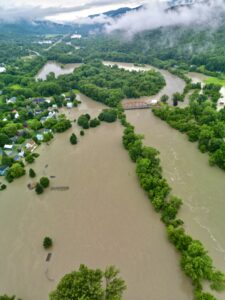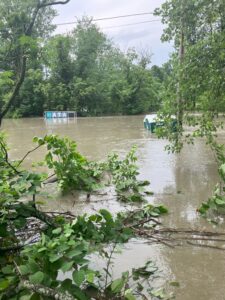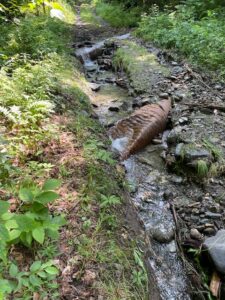This week marks a full year since Vermont was inundated with record rainfall that left many of our communities underwater and thousands of Vermonters with damaged homes, businesses, and public infrastructure. On July 11th, 2024, as an unfortunate and unwelcomed anniversary of last summer’s flooding, communities across central Vermont are again underwater or otherwise dealing with the impacts of nearly 5” of rain that rapidly fell on already saturated soils.
Trails were certainly not spared the wrath of last summer’s storms, and while our thoughts go out to those cleaning up from the latest round of flooding, we wanted to take a moment to recognize the response and recovery our office, Chapters, and volunteers helped mobilize in 2023 and where we stand today one year out from historic flooding that hit the majority of our state with force.
Immediate Response – Community Support

In the immediate aftermath of the flooding that began on July 11th, 2023, VMBA and our Chapters focused our efforts on supporting the recovery efforts of local communities throughout Vermont. While we knew we would need to seek funding, resources, and volunteer time to restore the trails we steward, we also recognized that the more pressing need was to help our local businesses and homeowners clean up and begin the arduous rebuilding effort. We directed folks to support efforts like the VT Flood Response and Recovery Fund, established by the Vermont Community Foundation, and to put their time and energy into helping their neighbors. These efforts proved all the more critical as the rain continued to fall and communities across Vermont felt the repercussions of recurring flooding, landslides, and other storm-related damage. Our ability to motivate and mobilize the volunteer spirit that helped create the mountain bike trail infrastructure we now enjoy was a bring spot in an otherwise very gloomy summer.
VMBA Major Storm Recovery Fund
 As the rain subsided and our communities shifted from flood response to long-term recovery, we too shifted our focus back to trails. This work began with damage assessments and stabilizing maintenance to prevent further damage, as well as the mobilization of VMBA’s existing Major Storm Recovery Fund (MSRF). Established in the wake of a devastating wind storm that struck Cady Hill in 2018, the MSRF was intended to provide funding to Chapters to swiftly recover from catastrophic weather-related damage and bring trails back online quickly and without waiting for public funding (if applicable) or otherwise raise funds. We had never, however, envisioned using the MSRF for statewide damages like those experienced by our Chapters last summer.
As the rain subsided and our communities shifted from flood response to long-term recovery, we too shifted our focus back to trails. This work began with damage assessments and stabilizing maintenance to prevent further damage, as well as the mobilization of VMBA’s existing Major Storm Recovery Fund (MSRF). Established in the wake of a devastating wind storm that struck Cady Hill in 2018, the MSRF was intended to provide funding to Chapters to swiftly recover from catastrophic weather-related damage and bring trails back online quickly and without waiting for public funding (if applicable) or otherwise raise funds. We had never, however, envisioned using the MSRF for statewide damages like those experienced by our Chapters last summer.
Fortunately, the vast majority of the trails we manage held up remarkably well to the series of storms and incessant rain. Modern trail-building techniques focus on shedding water quickly off the trail tread and avoiding concentrating or ‘energizing’ of run-off. As a result, the total estimated damage to our 920+ miles of trails was less than $100,000. VMBA’s Trail Grant Committee, itself composed of representatives from over a half-dozen VMBA Chapters, quickly awarded nearly $14,000 from the MSRF to four Chapters for time-sensitive repairs to four Chapters across the State. These repairs emphasized resilience to future weather events – upsizing culverts, relocating trail tread, and rock-armoring drainages – in addition to bringing trails back online.
VOREC Flood Recovery Grant
In addition to our MSRF grants, Chapters across the state invested both volunteer and paid trail crew time to repair and restore the trails they manage, and projects that were not vital to trails reopening but would be essential to prevent future damage were put on hold for the 2024 build season. Over the winter and based in part on input from trail organizations across the state, the Vermont Outdoor Recreation Economic Collaborative (VOREC) added a ‘Flood Recovery’ tract to their annual Community Grant Program with $1M in dedicated funding. VMBA applied for and received nearly $60,000 in assistance, covering both work already performed in the weeks and months after the flooding and new projects slated for this summer. These funds thus helped replenish our MSRF, now $25,000 strong, provide Chapters the resources to pursue projects they put on hold last year, and conduct new projects focused on making trails more resilient to future inclement weather events.
Our enormous thanks to the VOREC Community Grant Program for this support – read about all the grant recipients in this recent Press Release.
Building Resilience and Preparing for the (Wetter) Future
It should not go unnoticed that a year to the day from the start of last summer’s flooding, the remnants of tropical storm Beryl dumped inches of rain on top of already saturated soils across central Vermont. Two 100-year floods in the span of 12 years is further evidence that such weather events are much more likely in a future shaped by climate change.
 What does that mean for trails? Last summer, we experienced prolonged stretches of nearly statewide network closures, waiting for saturated trails to dry as the next round of rainstorms rolled in. While most trails built to modern standards showed they could withstand the wet weather, these designs are also not generally intended for wet-weather use. Such ‘all weather’ trails use extensive drainage to keep water off the trail tread entirely, rock armor sections that do become damp, and often bring in fill materials that are extremely durable and fast draining (e.g. gravel). Unsurprisingly, such trails are considerably more expensive to build than conventional sustainable trails and rely heavily on maintenance to ensure drainages remain clear. VMBA is actively exploring where and how we might establish such trails in targeted areas across the state, providing riders places to pedal even amid persistent precipitation.
What does that mean for trails? Last summer, we experienced prolonged stretches of nearly statewide network closures, waiting for saturated trails to dry as the next round of rainstorms rolled in. While most trails built to modern standards showed they could withstand the wet weather, these designs are also not generally intended for wet-weather use. Such ‘all weather’ trails use extensive drainage to keep water off the trail tread entirely, rock armor sections that do become damp, and often bring in fill materials that are extremely durable and fast draining (e.g. gravel). Unsurprisingly, such trails are considerably more expensive to build than conventional sustainable trails and rely heavily on maintenance to ensure drainages remain clear. VMBA is actively exploring where and how we might establish such trails in targeted areas across the state, providing riders places to pedal even amid persistent precipitation.
In the near term, VMBA is prioritizing climate resilience into all new builds and trail repairs. Last summer provided a clear guide as to the precipitation we can expect in the future, and as a result, we’re upsizing Culverts, armoring crossings, and rerouting trails to higher (and dryer) ground. Your VMBA Memberships and the support it provides the Primary and Add-on Chapters you join is absolutely vital to funding this work and ensuring we can continue to improve the riding experience in Vermont no matter what mother nature – and climate change – throws our way.
